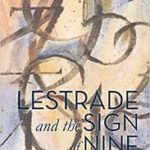Good Reads meta-data is 223 pages, rated 3.91 by a scant 46 litizens
Genre: krimi, pastiche
Verdict: clever and refreshing, but with a sour aftertaste.
In the world of Victorian England in the year 1886 all is not right with the world. Across the green land the (lecherous) rector, the (plagiarist) novelist, and the (cheating) speculator have one thing in common: they were murdered! There is only man for this job: Sholto Lestrade, Inspector, Scotland Yard. Maybe so but while he gets on wit h it and another five seemingly respectable Victorians are murdered and each, it turns out, was a despicable villain beneath the veneer of respectablility. With each of the eight victims is an inscrutable symbol [see front cover below].
h it and another five seemingly respectable Victorians are murdered and each, it turns out, was a despicable villain beneath the veneer of respectablility. With each of the eight victims is an inscrutable symbol [see front cover below].
As Lestade goes hither and thither, arriving always too late to stop the next murder, he keeps running across an annoying prat accompanied by a bumbling doctor, Holmes and Watson they are by name. Lestrade has neither the time nor the patience to sort these two out, but why are they always underfoot. Indeed, who are they?
The book opens with workmen excavating a foundation where they find a limbless body in between discussing Georg Hegel’s influence on Karl Marx’s philosophy of history in a cockney accent so thick it took this reader sometime to realise what they were talking about, but when dawned the realisation there followed the guffaws. So unexpected! So well done! That alone was worth the price of admission.
Lestrade manages to avoid the tide of history, but has to deal with two, one after another in quick succession, Home Secretaries who want a immediate resolution without any fuss, no expenditure, and no inquiry into respectable gentlemen, as well as machine guns, while dreading his inadvertent agreement to appear in the Police Annual Review for Charity to imitate Sarah Bernhardt.
That would seem to be more than enough, Yet there is also larded through it some racism, homophobia, and sexism. While these attitudes reflect the Victorian times, they do not advance the plot, limn any character development, or enrich the context. What they do is distract and irritate the contemporary reader. They are, in short, gratuitous. Strangely in this day when virtue display is so routine few reviewers on either GoodReads or Amazon refer to this business. I would have thought it offered a perfect chance to strut one’s virtue.
This title is number 12 in the Sholto Lestrade Mysteries from the industrious Trow who also has two other series since he cannot keep his hands off the keyboard.

I’d be willing to try another Lestrade in the hope that the racism, sexism, homophobia was not ingrained in the writing. But only one, least the Victorian setting licenses the author’s prejudices.
